15 Key Factors for Effective Meta Titles
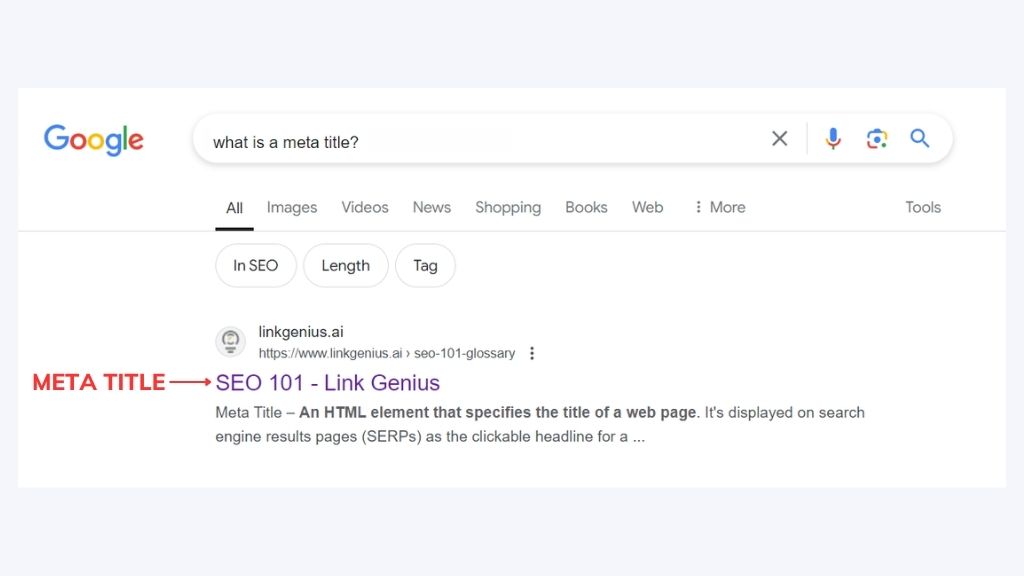
Creating effective meta titles is crucial for SEO success. Meta titles, also known as title tags, play a significant role in helping search engines understand what your webpage is about. They also influence whether users click on your link in search results. In this article, we will explore the key factors that contribute to creating effective meta titles.
In this article:
- What is a Meta Title?
- How Important are Meta Titles?
- 15 Factors To Remember When Creating Meta Titles
What is a Meta Title?
A meta title is the title of a webpage that appears in search engine results and the browser tab. It provides a brief summary of the page’s content.
How Important are Meta Titles?
Meta titles are important because they:
- Improve SEO: Help search engines understand the content of your page.
- Boost Click-Through Rates (CTR): Encourage users to click on your link.
- Enhance User Experience: Provide users with a clear idea of what to expect from your page.
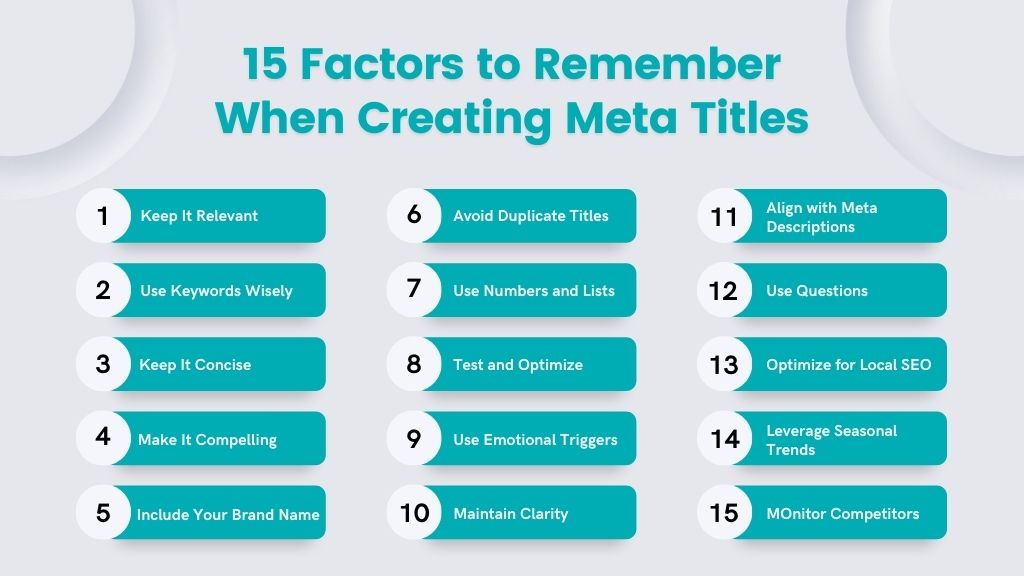
15 Factors To Remember When Creating Meta Titles
1. Keep It Relevant
Ensure that your meta title accurately reflects the content of your page. Misleading titles can result in high bounce rates and poor user experience. Understand what users are looking for and create a meta title that’s relevant and matches their search intent. This increases the chances of users clicking on your link.
2. Use Keywords Wisely
Include your primary keyword in the meta title. This helps search engines understand the main topic of your page. Additionally, incorporate secondary keywords if they fit naturally. Avoid keyword stuffing, as this type of grey hat SEO can harm your rankings.
3. Keep It Concise
Aim for a meta title length of 50-60 characters. This ensures that your title is fully displayed in search results. Long titles may get cut off in search results, which can affect their effectiveness. Keep it concise and to the point.
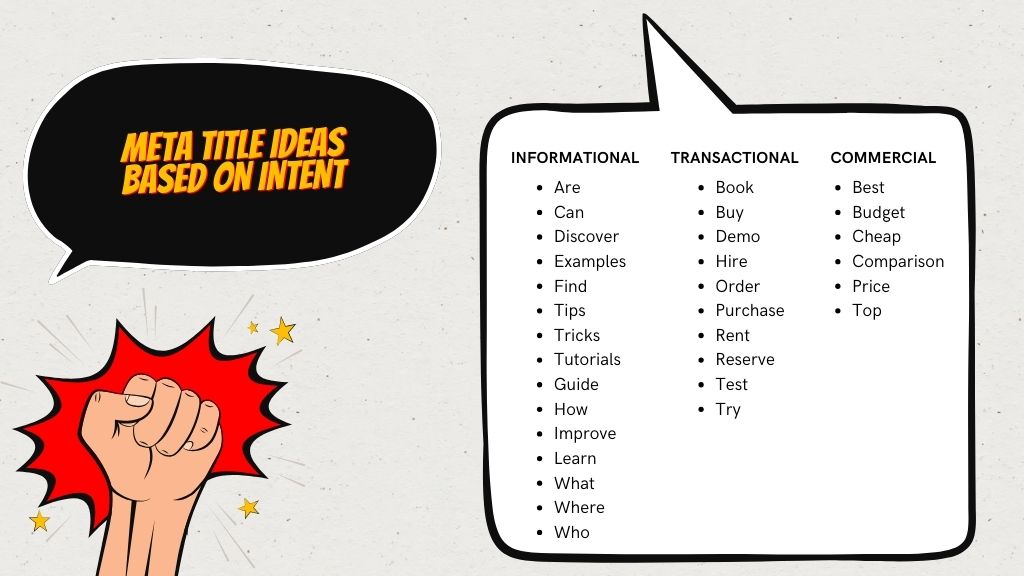
4. Make It Compelling
Use action-oriented words like “Learn,” “Discover,” or “Find” to make your title more engaging. This encourages users to click on your link. Show the benefits of clicking on your link. For example, “Learn SEO Tips to Boost Your Rankings” is more compelling than “SEO Tips.”
5. Include Your Brand Name
Including your brand name in the meta title can help build brand recognition and trust. Users are more likely to click on links from brands they recognize. Place branded keywords at the end of the title to keep the focus on the main keywords and benefits.
6. Avoid Duplicate Titles
Ensure that each page on your website has a unique meta title. Duplicate titles can confuse search engines and harm your SEO. Make each title descriptive and specific to the page’s content. This helps search engines differentiate between pages.
7. Use Numbers and Lists
Using numbers in your meta title can attract attention and increase click-through rates. For example, “10 Tips for Better SEO” is more engaging than “SEO Tips.” Numbers and lists provide clear expectations for users, making them more likely to click on your link.
8. Test and Optimize
Conduct A/B testing to determine which meta titles perform best. Test different variations and track their performance. Regularly review and update your meta titles based on performance data. Continuous optimization for user engagement can lead to better results.
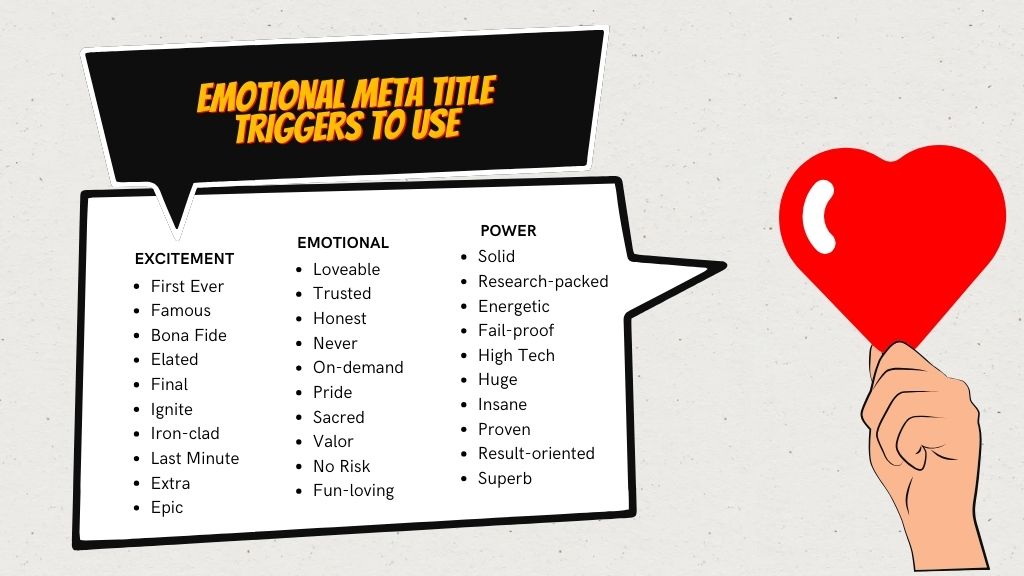
9. Use Emotional Triggers
Incorporate emotional triggers in your meta titles to create a connection with users. Words like “amazing,” “essential,” or “unbelievable” can evoke emotions and increase clicks. Address common pain points or problems users may have. For example, “How to Fix Common SEO Issues” speaks directly to users seeking solutions.
10. Maintain Clarity
Use simple and clear language in your meta titles. Avoid jargon or complex terms that may confuse users. Be straightforward about what users can expect from your page. Clear and honest titles build trust and improve user experience.
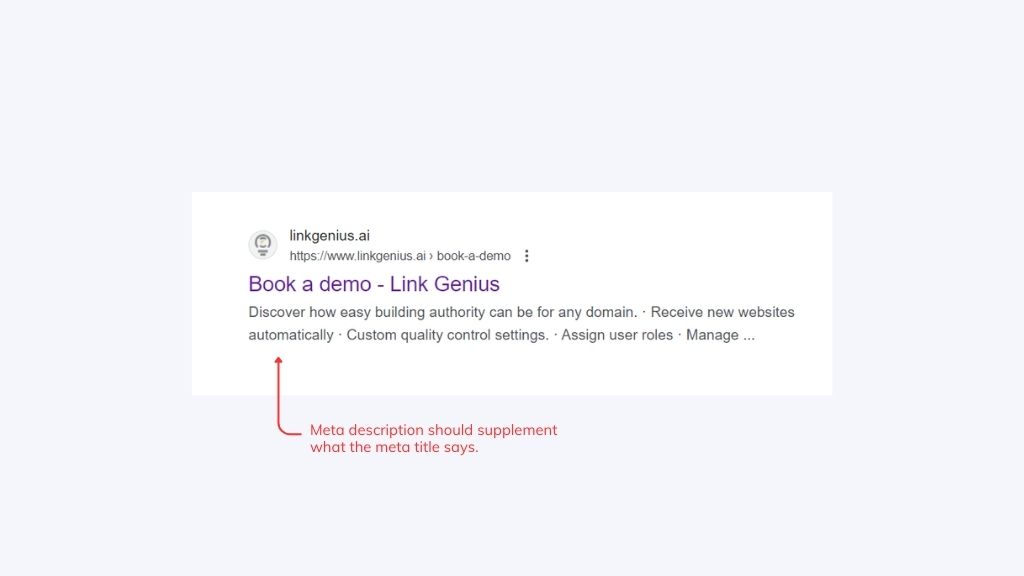
11. Align with Meta Descriptions
Ensure that your meta title and meta description work together to provide a consistent message. This reinforces the relevance of your content and encourages clicks. While the meta title grabs attention, the meta description provides more details. Make sure they complement each other for maximum effectiveness.
12. Use Questions
Using questions in your meta titles can spark curiosity and encourage clicks. For example, “What Are the Best SEO Strategies?” invites users to find out more. Questions can directly address common user queries, making your content more relevant and enticing.
13. Optimize for Local SEO
For local businesses, including the location in the meta title can improve local SEO. For example, “Best Pizza in New York” targets users searching for pizza in New York. Use location-specific keywords to attract local traffic and get a spot in Google’s local finder. This can increase visibility and drive more relevant visitors to your site.
14. Leverage Seasonal Trends
Create meta titles that leverage seasonal trends or events. For example, “Top Holiday Marketing Tips” can attract more clicks during the holiday season. Updating meta titles to reflect seasonal trends keeps your content relevant and timely, attracting more visitors.
15. Monitor Competitors
Analyze the meta titles of top-ranking competitors. Identify what works well for them and adapt those strategies to your own titles. While it’s useful to learn from competitors, make sure your meta titles stand out. Offer unique value or a different perspective to attract users.
Short But Effective
Creating effective meta titles is essential for SEO success. Remember these 15 key factors to write meta titles that improve your search engine rankings, boost click-through rates, and enhance user experience. Keep your titles relevant, concise, and compelling, and continuously optimize them for the best results.
Did you know your meta titles can help your off-page SEO efforts as well? After securing high-quality backlink opportunities with Link Genius, effective meta titles can hasten the process of getting links to your website.
Sign up for Link Genius today and see how a holistic SEO campaign can do wonders for your business.
